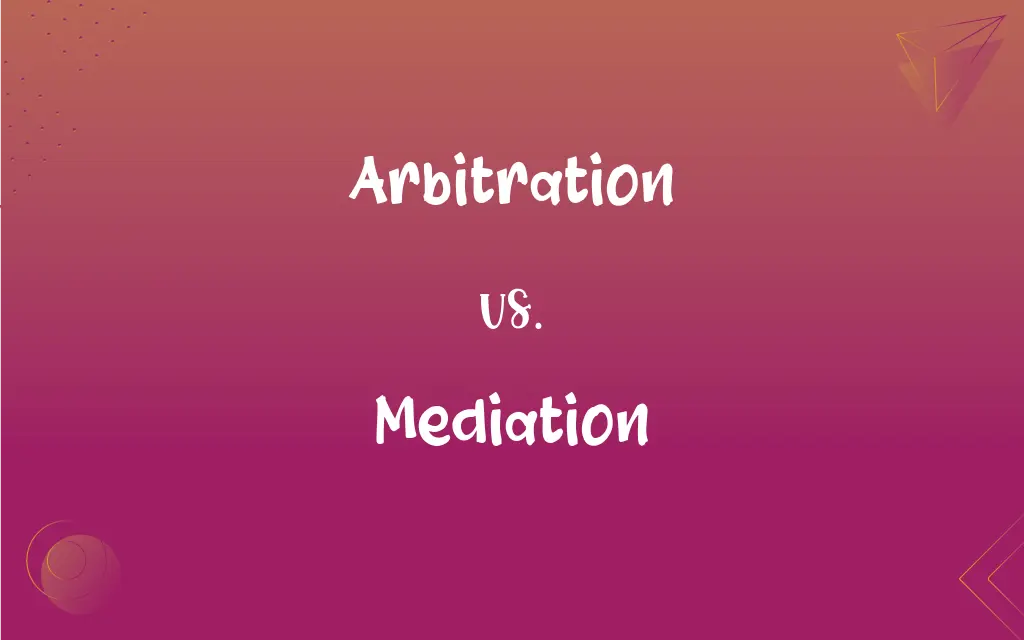Arbitration vs. Mediation: What's the Difference?
Edited by Aimie Carlson || By Harlon Moss || Updated on October 26, 2023
Arbitration involves a neutral third party rendering a binding decision, while mediation assists disputing parties in reaching a voluntary agreement.

Key Differences
Arbitration and mediation are both alternative dispute resolution (ADR) mechanisms, but they function differently. Arbitration involves a neutral third-party, called an arbitrator, who reviews the evidence and arguments of the disputing parties and then makes a decision that is often binding on them.
Mediation, in contrast, employs a neutral facilitator, known as a mediator. This individual helps the parties communicate, identify issues, and work toward a mutual agreement. Crucially, a mediator doesn't impose a decision; instead, the outcome is crafted by the parties involved.
The nature of the outcome distinguishes arbitration from mediation. In arbitration, the final decision, or the "award," is typically enforceable in the same manner as a court judgment. Parties often opt for arbitration when they want a conclusive resolution without resorting to the court system.
Mediation, being a more collaborative process, is often sought when parties wish to preserve their relationship or when they value privacy and a more flexible process. The success of mediation largely depends on the willingness of the parties to negotiate and reach a consensual agreement.
In essence, while both arbitration and mediation offer alternatives to litigation, the former provides a definitive decision by an arbitrator, while the latter facilitates a dialogue aiming for a mutually agreed-upon resolution.
ADVERTISEMENT
Comparison Chart
Definition
A method where a neutral third party renders a decision
A process aiding parties in reaching a voluntary agreement
Binding Outcome
Typically produces a binding decision
Produces non-binding resolutions
Role of Neutral Party
Decides the outcome
Facilitates communication without deciding the outcome
Enforceability
Awards are often enforceable like court judgments
Agreements can be made binding if drafted into contracts
Process Nature
More formal and adjudicative
Collaborative and flexible
ADVERTISEMENT
Arbitration and Mediation Definitions
Arbitration
Arbitration can be either mandatory (by law) or voluntary (by agreement).
Their contract stipulated mandatory arbitration for any disputes.
Mediation
Mediation is a process where a neutral party helps disputants reach a mutual agreement.
The couple sought mediation to amicably divide their assets.
Arbitration
In arbitration, the arbitrator reviews evidence and hears arguments before deciding.
The arbitrator spent weeks reviewing documents before the hearing.
Mediation
Mediation is often chosen for its flexibility and confidentiality.
They preferred mediation to keep their disagreements private.
Arbitration
Arbitration is commonly used in commercial, labor, and international disputes.
The union and management settled their differences through arbitration.
Mediation
Mediation can be applied in various contexts, including family, business, and community disputes.
The neighborhood used mediation to address noise complaints.
Arbitration
Arbitration is an alternative to litigation where disputes are resolved by a neutral third party.
They chose arbitration to avoid a lengthy court battle.
Mediation
Mediators don't impose decisions but guide parties toward consensus.
The mediator's questions prompted them to find common ground.
Arbitration
Arbitration often results in a binding decision known as an "award."
The company awaited the final award from the arbitration panel.
Mediation
Mediation is non-adjudicative, focusing on facilitating communication.
Mediation allowed both parties to voice their concerns openly.
Arbitration
The process by which the parties to a dispute submit their differences to the judgment of an impartial person or group appointed by mutual consent or statutory provision.
Mediation
To resolve or settle (differences) by working with all the conflicting parties
Mediate a labor-management dispute.
Arbitration
The act or process of arbitrating.
Mediation
To bring about (a settlement, for example) by working with all the conflicting parties.
FAQs
Is an arbitration decision legally binding?
Typically, yes, arbitration decisions are enforceable much like court judgments.
Who selects the arbitrator or mediator?
Parties can mutually select them, or they can be appointed by a relevant organization or authority.
Can an arbitrator act as a mediator?
It's possible, but roles should be clear, and parties must consent.
How does mediation differ from arbitration?
In mediation, a neutral party facilitates communication to help parties reach an agreement, while in arbitration, the arbitrator makes a binding decision.
Can mediation decisions be enforced in court?
Mediation outcomes are voluntary but can be made enforceable if incorporated into a written agreement.
What types of disputes are best for mediation?
Mediation is effective where parties wish to preserve relationships and need flexible solutions.
Can I use arbitration for any dispute?
While many disputes can be arbitrated, some might be excluded due to legal restrictions or the nature of the agreement.
Is arbitration always private?
Arbitration is usually private, but the level of confidentiality can vary based on the agreement.
What's the primary goal of mediation?
The main aim is to assist parties in reaching a mutually agreeable resolution.
Can I appeal an arbitration decision?
Appeals are limited in arbitration and depend on the arbitration agreement and relevant laws.
How long does mediation typically last?
Mediation can last a few hours to several days, depending on the dispute's complexity.
Can lawyers participate in both processes?
Yes, lawyers can represent parties in both arbitration and mediation.
What is arbitration?
Arbitration is an alternative to court where a neutral third party decides the outcome of a dispute.
Is mediation legally binding?
Not by itself, but parties can formalize agreements reached in mediation into binding contracts.
Which is faster, arbitration or mediation?
Mediation can be faster as it's collaborative, but timelines vary based on the specific situation.
Who pays for arbitration?
Parties usually share the cost, but it can vary based on the agreement.
Is arbitration more formal than mediation?
Generally, yes, arbitration has more structured procedures resembling a court trial.
What if we can't reach an agreement in mediation?
Parties can then pursue other options, like arbitration or litigation.
Are arbitrators and mediators always lawyers?
Not necessarily; they can be experts in relevant fields or trained dispute resolution professionals.
Which is more cost-effective, arbitration or mediation?
Mediation can be more cost-effective due to its collaborative nature, but costs vary based on the specifics.
About Author
Written by
Harlon MossHarlon is a seasoned quality moderator and accomplished content writer for Difference Wiki. An alumnus of the prestigious University of California, he earned his degree in Computer Science. Leveraging his academic background, Harlon brings a meticulous and informed perspective to his work, ensuring content accuracy and excellence.
Edited by
Aimie CarlsonAimie Carlson, holding a master's degree in English literature, is a fervent English language enthusiast. She lends her writing talents to Difference Wiki, a prominent website that specializes in comparisons, offering readers insightful analyses that both captivate and inform.































































